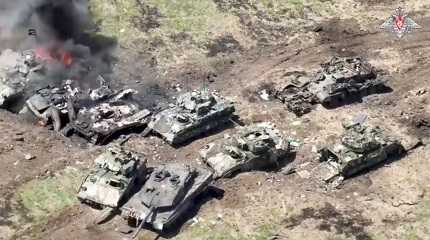
MOSCOW, June 11 (Reuters) - Russia on Sunday said it had destroyed at least seven German-made Leopard tanks and five U.S.-made Bradley vehicles over 48 hours while repelling Ukrainian attacks, though Russian bloggers reported Ukraine had briefly pierced part of the Russian line.
Ukrainian President Volodymyr Zelenskiy acknowledged on Saturday that his military was engaged in "counter-offensive and defensive operations", a day after President Vladimir Putin said Russia had repelled the first attacks of the offensive.
Russia's defence ministry said it had repelled more than a dozen Ukrainian attacks over the past day in three major directions and had destroyed a column of armoured vehicles of the 128th Mountain Assault Brigade in the Zaporizhzhia region.
"During the past day, the armed forces of Ukraine continued unsuccessful attempts of offensive actions in the Donetsk, southern Donetsk and Zaporizhzhia directions," it said.
Reuters was unable to immediately verify battlefield reports from either side, but was able to verify the location though not the date of a video showing Russian drones striking Ukrainian-manned tanks in the Zaporizhzhia region.
Russian military bloggers said Ukrainian forces had smashed through a section of the Russian lines south of the town of Velyka Novosilka, briefly taking several villages as Russian forces retreated to higher ground.
Vladimir Rogov, a Russian-installed official in the part of the Zaporizhzhia region controlled by Russia, said Russian forces had then taken the village back.
Ukraine has said it made gains near Bakhmut, which fell to Russia last month.
Russia's defence ministry published several videos and pictures over recent days showing numerous strikes on Ukrainian-manned armoured vehicles and tanks from Ka-52 attack helicopters and drones.
In footage released by the ministry on Saturday, drones were shown striking tanks in the Zaporizhzhia region where Kyiv's forces have so far focused their counteroffensive.
Reuters was able to verify the location of the video as two miles south of the village of Mala Tokmachka in Zaporizhzhia by vegetation lines, crop squares and buildings that matched satellite imagery of the area.




